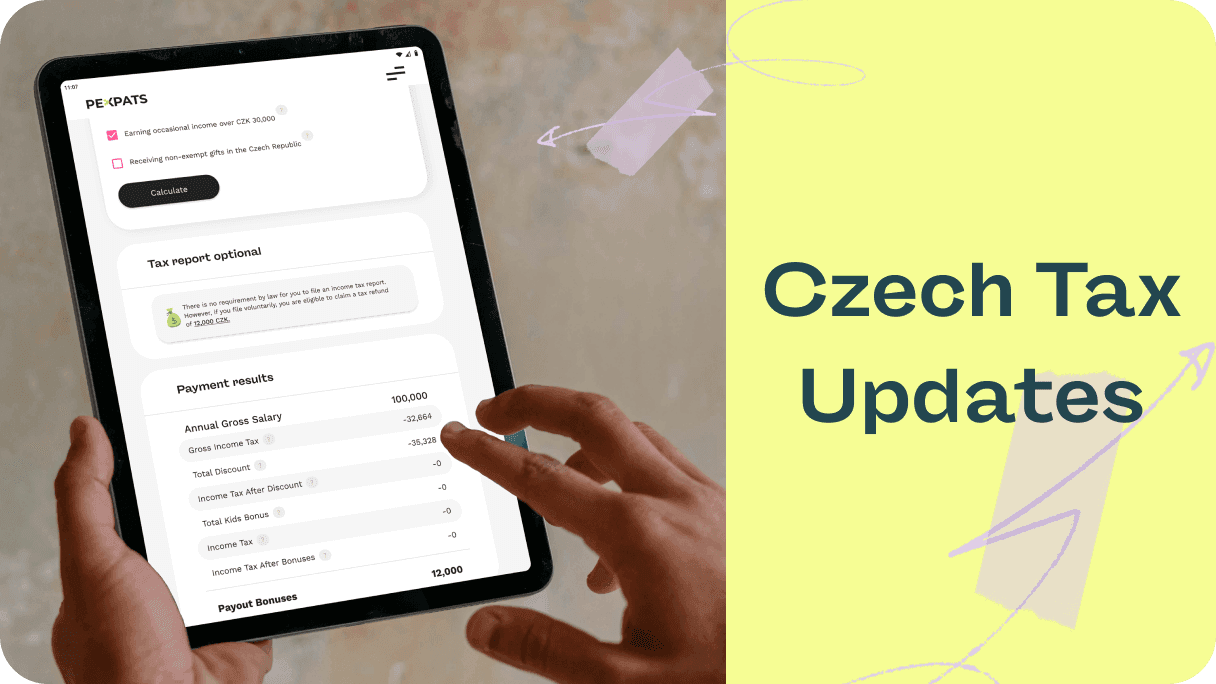2026 Czech Tax Updates
The Czech Republic confirmed several 2026 updates affecting freelancers (OSVČ), employees, and companies. The summary below highlights the main changes.
Czech Tax Updates 2025 and 2026 (Valid from 1 January 2026)
Category | 2025 | 2026 | Change |
|---|---|---|---|
Social-Insurance Minimum Deposit | 4 759 CZK / month | 5 720 CZK / month | + 961 CZK |
Health-Insurance Minimum Deposit | 3 143 CZK / month | 3 306 CZK / month | + 163 CZK |
Flat-Tax Band 1 | 8 716 CZK / month | 9 984 CZK / month | + 1 268 CZK |
23 % Income-Tax Threshold (OSVČ) | 1 676 052 CZK / year | 1 762 812 CZK / year | + 86 760 CZK |
Maximum Social-Insurance Base | 2 110 416 CZK / year | 2 350 416 CZK / year | + 240 000 CZK |
All information verified using data from the Czech Financial Administration (Finanční správa ČR), maintained by Pexpats.
The increase in minimum social and health insurance deposits affects mainly freelancers (OSVČ) with lower income.
These deposits are advance payments later recalculated based on real annual income, so at the end of the year, each person either pays the balance or the minimum fixed deposits cover the final amount. Although the minimum deposits increased in 2026, the insurance rates remain the same.
Freelancers with medium or higher income are not directly affected, as their final insurance is calculated from real income, which is higher than the minimum deposits.
For higher earners, the update is partly positive because the 23 percent income tax threshold moved higher, so a larger part of income stays under the 15 percent tax rate.
The maximum social insurance base also increased, which can raise payments for the highest incomes.
Overall, the 2026 changes raise monthly costs for lower-income freelancers but slightly improve the tax position of higher-income ones.
Freelancers must pay monthly deposits for social and health insurance, even with zero income.The table below shows the updated 2026 minimum contributions, including the special rate for those in their first year of registration.
Freelancer (OSVČ) Minimum Insurance Deposits 2025 and 2026
Type of Insurance | 2025 Deposit | 2026 Deposit | Change |
|---|---|---|---|
Social Insurance – Standard Rate | 4 759 CZK / month | 5 720 CZK / month | + 961 CZK |
Social Insurance – First Year | 3 399 CZK / month | 3 575 CZK / month | + 176 CZK |
Health Insurance | 3 143 CZK / month | 3 306 CZK / month | + 163 CZK |
Optional Sickness Insurance | 243 CZK | 243 CZK | Unchanged |
All information verified using data from the Czech Social Security Administration (ČSSZ) and the Všeobecná zdravotní pojišťovna (VZP), maintained by Pexpats.
Freelancers who use the flat-tax (paušální daň) system pay one combined monthly amount that includes income tax, social insurance, and health insurance.
The table below lists the monthly rates for 2025 and 2026. Only Band 1 was adjusted; Bands 2 and 3 remain unchanged.
Flat-Tax (Paušální Daň) Bands 2025 and 2026
Band | 2025 Monthly Rate | 2026 Monthly Rate | Change |
|---|---|---|---|
Band 1 | 8 716 CZK | 9 984 CZK | + 1 268 CZK |
Band 2 | 16 745 CZK | 16 745 CZK | Unchanged |
Band 3 | 27 139 CZK | 27 139 CZK | Unchanged |
All information verified using data from the Czech Financial Administration (Finanční správa ČR), maintained by Pexpats.
For employees, the main 2026 updates concern the income-tax threshold and the maximum base for social-insurance contributions.
Employee Income Tax and Social-Insurance Limits 2025 and 2026
Rule | 2025 (Gross Monthly Salary) | 2026 (Gross Monthly Salary) | Change |
|---|---|---|---|
23 % Tax Rate Applies From | 139 671 CZK / month | 146 901 CZK / month | + 7 230 CZK |
Maximum Social-Insurance Base | 179 761 CZK / month | 195 868 CZK / month | + 16 107 CZK |
All information verified using data from the Czech Financial Administration (Finanční správa ČR), maintained by Pexpats.
Spouse Tax Deduction – New Conditions
You can still deduct a spouse earning under CZK 68,000/year, but in 2026, there’s an added condition: The spouse must care for a child under 3 years old. This is a new rule and affects many families claiming this deduction.
Need Help Filing Taxes in The Czech Republic?
At Pexpats, we specialize in Czech tax filings for:
Freelancers (OSVČ)
Employees and expats
Business owners and startups
Common Questions About Czech Taxes in 2026
What is the freelancer income tax rate in the Czech Republic for 2026?
Freelancers with a Czech trade license (OSVČ) pay 15% up to CZK 1,762,812, and 23% on income above that.
What are the 2025 Czech flat tax bands for freelancers?
Band 1: CZK 9,984/month Band 2: CZK 16,745/month Band 3: CZK 27,139/month Each includes Czech income tax, social security, and health insurance.
Do employees pay sickness insurance in the Czech Republic in 2026?
Yes. As of 2026, employees contribute 0.6% of their gross salary as sickness insurance.
Can Czech companies file taxes in foreign currency in 2026?
Yes. Starting with the 2024 tax year, Czech companies can use EUR, USD, or GBP for accounting and tax declarations.


